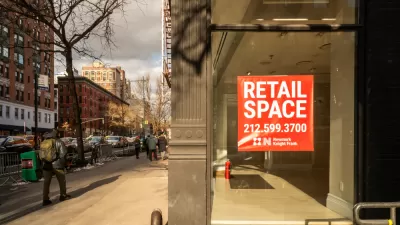Across racial and economic lines, not all cities are recovering equally.

Kenrya Rankin shares news of a new study from the Urban Institute that ranks city on the inclusiveness of economic recovery since the Great Recession.
The "Inclusive Recovery in the United States" [pdf] report created indices for the 274 most populated cities in the United States, tracking inclusivity at intervals, i.e., 1980, 1990, 2000, and 2013. According to the definition included in the report, "inclusive recovery occurs when a place overcomes economic distress in a way that provides the opportunity for all residents—especially historically excluded populations—to benefit from and contribute to economic prosperity. In short, the recovery must embody both economic and racial inclusion to be equitable."
All five of the most inclusive recoveries were located in California: Fremont, Daly City, Torrance, Santa Clara, and Elk Grove. At the other end of the spectrum, Dallas' recovery has been the least inclusive, followed by Shreveport, Houston, South Bend, and Phoenix.
For more insight into the report, see also a blog post written by several of the authors of the report. That post provides five bog takeaways from the report, including insight into what makes inclusive cities inclusive.
FULL STORY: STUDY: The Most—and Least—Inclusive Cities in the Nation

Planetizen Federal Action Tracker
A weekly monitor of how Trump’s orders and actions are impacting planners and planning in America.

Chicago’s Ghost Rails
Just beneath the surface of the modern city lie the remnants of its expansive early 20th-century streetcar system.

San Antonio and Austin are Fusing Into one Massive Megaregion
The region spanning the two central Texas cities is growing fast, posing challenges for local infrastructure and water supplies.

Since Zion's Shuttles Went Electric “The Smog is Gone”
Visitors to Zion National Park can enjoy the canyon via the nation’s first fully electric park shuttle system.

Trump Distributing DOT Safety Funds at 1/10 Rate of Biden
Funds for Safe Streets and other transportation safety and equity programs are being held up by administrative reviews and conflicts with the Trump administration’s priorities.

German Cities Subsidize Taxis for Women Amid Wave of Violence
Free or low-cost taxi rides can help women navigate cities more safely, but critics say the programs don't address the root causes of violence against women.
Urban Design for Planners 1: Software Tools
This six-course series explores essential urban design concepts using open source software and equips planners with the tools they need to participate fully in the urban design process.
Planning for Universal Design
Learn the tools for implementing Universal Design in planning regulations.
planning NEXT
Appalachian Highlands Housing Partners
Mpact (founded as Rail~Volution)
City of Camden Redevelopment Agency
City of Astoria
City of Portland
City of Laramie




























